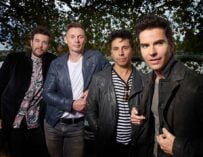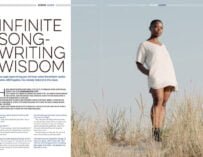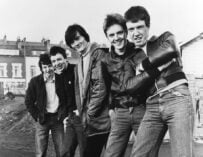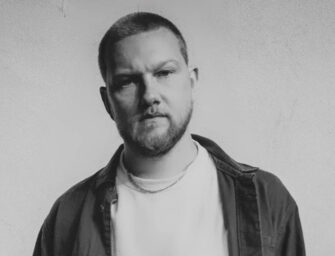Our cover star was one of rock and metal’s shining stars – the head honcho of Slipknot and Stone Sour
He’s a man who fronts not one, but two of the biggest bands from those genres and has sold over 40 million records worldwide. He’s a singer, songwriter, lyricist, comic book author, actor, and the owner of the second-widest range of any vocalist currently doing the rounds, with his five-and-a-half octaves only beaten by Mike Patton’s six.
Who is this man? Ladies and gentlemen, we give you Corey Taylor, the head honcho of both Slipknot and Stone Sour. Taylor has been in the music industry since 1992, when he formed Stone Sour. However, it wasn’t until he joined Slipknot in 1997 that his career truly began its journey into the stratosphere. With Slipknot, Taylor has released six albums, scoring two US Billboard No 1s and one UK Album Chart No 1.
As the leader of Stone Stone, he has been a fixture in both charts, with the brilliant Hydrograd making it into the Top 5 of each. We caught up with Corey in the midst of Stone Sour’s biggest ever European tour and it is they who are the focus of our discussion. We picked his brains about songwriting, his legacy, the state of rock music, and Trump.
What did we discover? Not only is he a legend of his field, he’s also a thoroughly nice fellow. For the rest, you’ll have to read on…
It’s 15 years since the release of Stone Sour [the band’s self-titled debut LP], 17 years since you reformed, and 25 years since Stone Sour started: where do you find the inspiration to keep going?
“I just feel like there’s just so much more music to make – it’s the same with Slipknot too. The beautiful thing about Stone Sour is that there’s this whole realm of rock ‘n’ roll that I feel like we haven’t even touched on yet. We’re really starting to come into our own and it’s the same with Slipknot; there are just so many areas that I feel that we can tap into.
“I guess that’s the thing that should always keep us all going. The chance to write the ultimate song, the next big tune that people want to sing back at you. That’s the inspiration for me, trying to find that next big song that everyone’s going to love and that you always look forward to singing for everybody.”
How have you found the reception on your current tour in comparison to your previous ones?
“It’s been our biggest European run ever. Every show is sold out, we’re averaging 4,000 people a night, it’s huge, massive! And it’s only getting bigger – everything is sold out, so we have people complaining that they can’t get a ticket!
“To have that happening after this many years is a damn good feeling. It tells me that we’re still doing it for the right reasons and that we’re still doing it at the peak of our powers and our talent and our creativity. And it also means that we’ve tapped into a whole other audience who are coming along for the ride and are just as stoked as we are. I’m very, very fortunate to be a part of this right now.”
How has the songwriting of Stone Sour evolved since you began?
“I tell you what, man, I feel like I’ve gotten better, to be honest. My mind and my scope and my openness for new ideas are still there. But I feel like I’ve really come into my own with my lyrics, with the chances that I take with my music, and I like that.
“A lot of people as they get older they tend to close themselves up, they tend to close themselves off from new ideas and new experiences. For me, I remember what I’ve already written so why would I want to keep on rewriting that stuff? I want new frontiers, I want new ideas, I want new chances because that’s how you keep expanding the boundaries of the music that you’re known for.
“For me, I love that I’m balancing the same kind of selflessness and bravery with the music of the songs, with almost a refreshing maturity when it comes to the lyrics that I write.”
What do you do to keep things fresh and to keep things moving?
“It’s interesting. I guess I just look and go ‘what am I trying to say? And what type of song would I like to use to do it?’ Sometimes you go by your standalone. When I was writing the music for Rose Red Violent Blue (This Song Is Dumb & So Am I) I was kind of saying to myself that I would love to write a song that has kind of a 70s vibe to it. And honestly, it’s strange because it came out in a way that didn’t sound 70s at all, but it kind of has that old skool rock ‘n’ roll vibe to it.
“So the inspiration for that song for me was everything from The Clash to Cheap Trick. Those are two influences that I haven’t worn as openly on my sleeve, without people knowing, but without those two bands, I’d be nothing. So for me, being able to draw that inspiration this many years later, from two bands that have been with me my whole life, and really kind of becomes something more than I even thought it would be, is pretty badass, to be able to create something new and interesting that makes the audience go ‘Woah, where did that come from?! That’s where it comes from, that’s where it’s at. The excitement.
“So I guess it’s a lot of different things; my ears prick up when I hear something I haven’t heard before, or feel something I haven’t felt before, something that kind of draws me in. That’s what gets me excited about working on other people’s stuff. And when it comes to my stuff, it’s very much about the vibe of what I’m trying to put out. And then I just tap into it and give it to the guys and let them take it somewhere that I never thought it would ever go.”
Will all of the songwriting for Stone Sour begin with you?
“We kind of do it all. We all write individually, but we can also jam together and kind of let it happen. I know that Christian, Roy, and Chow, have done a lot of stuff together. And then Christian and Josh have done a lot of stuff together. We can pull from any realm, from any inspiration, from any type of exercise when it comes to the songwriting. For us, there are no wrong answers. It’s just music that we’re not feeling, or music that we are totally feeling.
“That’s where it comes from, man. If there’s stuff we’re not vibing on, that we’re not feeling immediately, then we put it on the backburner. And we work on it later. But we always try to focus on the stuff that’s got our attention, that we focus on, whether it’s individually, or as a band. That’s what we try and follow into the realm of inspiration.”
You were 17 when Nevermind and The Black Album were released and you started Stone Sour a year later. How influential were those records/the success that came from them in you forming a band?
“The crazy thing is that I had my feet in so many different realms musically; not only did those albums come out, but a couple of years before that you had Slave To the Grind, Facelift, and then there were the mainstays: Appetite For Destruction, obviously being a massive Mötley Crüe fan, all the thrash stuff, all the early 80s hardcore stuff, I listened to everything.
“Then plus, coming from the Midwest, you had Soul Asylum, Prince, Chicago (Big Black)… So I had all these crazy influences going around me and the thing is that Stone Sour, when it started (and don’t laugh because this is true!) I wanted it to sound like a combination of Metallica, Skid Row, and Pearl Jam. Those three bands.
“Those were the bands I wanted Stone Sour to really draw from. And our early stuff, when I was singing before my balls dropped(!) it had that kind of vibe; it was a good heavy crunch to it, and this is back when I was singing and playing guitar on everything. But there was a good alternative bent to it, but we didn’t shy away from the big, I hate to say hair rock, but big hard rock choruses, and Skid Row had that. And I’m still to this day one of the biggest Skid Row fans of all time and people can kiss my ass on that!
“That’s where we started. And I think that mindset has stayed with me all through the years – fuck what everyone says, fuck what everybody thinks, and just write what you wanna write, do what you wanna do, sing what you wanna sing and don’t let anybody tell you what’s right and what’s wrong because that’s the way to talk yourself out of a great idea, to let other people decide whether a song is good to you, you know! It’s like, ‘hold on a second. If I dig this, just because you don’t, it doesn’t mean that I have to change what I think about it.’
“It’s just one of those things where I’d rather write something I’m happy about and fail, than to write something successful that didn’t come from my heart.”

Corey: “I’d rather write something I’m happy about and fail, than to write something successful that didn’t come from my heart”
Do you think rock still has the same power now as it did in the late 80s and early 90s?
“It’s interesting. I think it’s getting it back. I think a lot of it has lost its way, in a weird way. Before it used to be that you’d write some music and you’d go out and tour. Now everything’s so complicated, it’s capitulated, it’s commercialised, it’s stuck into little boxes; it has to mean something. I get so fucking bored with rock having to mean something. It doesn’t! Write a song and put it out there. Whether it’s a broken heart or a broken foot, just put it out there and let somebody feel it – it doesn’t have to be so serious.
“Honestly that’s one of the reasons why concerts have dwindled, as far as building a new audience for new bands, it’s because everyone thinks they have to be so serious all the time. And it’s also one of the reasons why the pop and hip hop audiences have never gone away, because they’re not nearly as serious, they’re just trying to have a good time.
“Rock is sorely missing that right now and that’s one of the things that we’re trying to do, we’re trying to bring that back. Bring that good time back. There are certain songs that mean something, but they don’t all have to be a fucking thesis on the depression of the human spirit. And you don’t always have to mosh to every song. I see people mosh to Through Glass and I go, ‘what the fuck are you doing?! Are you serious?!’
“People have forgot how to act at rock concerts – you come to have a good time and to release it and enjoy yourself. But because everybody feels like they have to be an extreme metal show, they don’t know how to act at a regular rock ‘n’ roll, or hard rock, concert.
“So, it’s tough. I think that a lot of bands are trying to bring that positive spirit back, but people are so cuckolded about how they’re supposed to be at a concert that they’re having a hard time picking that up. But we’ll see how it goes. I have faith that it’s [rock] still out there, especially with all the shitty pop and hip hop that’s out there. One day people are gonna wake up and go ‘oh, that’s all garbage. Let’s go back and check out what rock n roll’s up to.”
The pinned tweet on your Twitter account was: “all that is necessary for the triumph of evil is that good men (and women) do NOTHING.” – Edmund Burke. With Trump in office, what do you think people should be doing? And as a songwriter do you think you should be taking a particular action?
“Especially when you’re as, sadly(!), outspoken as I am, you tend to end up on one side or the other. The thing with Trump is that he’s just getting worse and worse. I have faith that people in the right places are doing what they can. But he’s such a jackass that it’s really hard to keep up with his missteps.
“So I pinned that Tweet specifically to remind people that sometimes you do have to speak up. Whether you’re on the right side or the wrong side you just can’t stay silent. But here’s the main thing, if you’re going to speak up, please know what you’re talking about! Please just read a fucking article, do some research, educate yourself. Too many people are stuck in ignorance and with feeling instead of with information, and that’s the tough part.
“That’s one of the reasons why I just say what I say and get out of it – because I know a lot of people are going to hit me with their ignorant emotion when it comes to defending the shit that that fucking man says. And I’m not gonna have it. It’s like the facts blatantly contradict everything that you’re saying about our president. And I’m not gonna try and convince a rock that it’s a shrub.
“The worst thing you can do on the planet is try and get involved in some one-sided argument where the other person has already decided you’re wrong. It’s like, ‘Well, OK, then we’re done here.’ I just kind of stand firm, hold fast, and batten down the fucking hatches!”
Tell me about the comic book for House Of Gold & Bones. What made you decide to get involved with that?
“That was something that was actually brought to me. It was something that I was spitballing to begin with. I had the story for the two albums and I’d written the short story and put it in the album so that people could read along, to try and tie the narrative together. Then my management really were the ones saying, ‘how do you feel about coming at this from a visual standpoint?’ And I said that I would love to give it a shot. We were able to get a really good deal with Dark Horse going. I’d never written a comic book but I’d read them, I’ve read them my whole life, but never written one. I have so much respect for scriptwriters, there’s a lot of work that goes into putting those things together.
“So for me it was a real learning experience. It enriched the way that I devour my entertainment now, just the amount of attention to detail that goes into it. I’m really proud of it. I knew it was going to be a short one, Dark Horse were really cool and supportive of it and said ‘let’s do this and let’s do it right – we don’t need a long-term relationship, let’s just do something really, really, cool.’ So, yeah, I’m pretty proud of that and it is one of my favourite things that I’ve ever done.”
You’ve got many more years ahead of you, but what do you think your legacy as a songwriter will be?
“I guess I would love for my legacy to be the longevity of it. The fact that I was able to produce so much quality for so long, with so many different projects – whether it was with Slipknot, or Stone Sour, or the various guest appearances, or side things that I’ve done in the past.
“I think that’s what I would like my legacy to be. To be someone who wasn’t afraid to risk, but who wasn’t afraid to write a song. Sometimes that’s all you want to do. People just think they’re so smart that they want their own way and they’ll walk all over a song just because they think they know what a song needs. The song just needs to fucking breathe – sometimes the song just needs to be the song that it was meant to be.
“As much I’m a songwriter I’m also a facilitator. Sometimes I just get out of the way and don’t try to do too much because that might detract from what you’re trying to say. So I guess that’s really the key isn’t it, to trying to stick around as long as you can, that you hope to, by not overstaying your welcome in the medium that you’re trying to work in. So yeah, longevity, quality, and hopefully I wasn’t too much of a jackass!”



































Related Articles